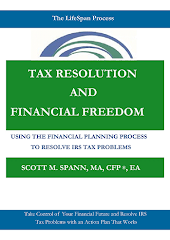It is important to understand the reasons for the tax problems and their underlying causes. If you have a tax issue, do not forget the ultimate goals that you have for the Tax Resolution and Financial Freedom process. You should be trying to deal with your tax problems and replacing the problematic financial behaviors with positive ones. This process requires accountability, so be honest with yourself. Now is not the time to dwell on past mistakes. You need to use the knowledge of past mistakes or uncontrollable circumstances as a motivator to guide you along the process of change.
Here is a review of some of the most common events or circumstances that may lead to tax trouble:
· Self-employment- Not understanding the self employment tax or simply neglecting to pay estimated taxes for self-employment income
· Tax protestor
· Failure to pay employment taxes or payroll taxes
· Taxation of Retirement Distributions
· Capital gains reporting related to the sale of stocks, bonds, mutual funds, etc.
· Changes related to an audit
· Insufficient taxes withheld from pay (W-4)
· Loss of job or income reduction
· Cash flow problems related to living beyond your means
· Poor financial management
· Not having enough money set aside for emergencies
· Divorce or other personal problems
· Business failure
· Health problems, medical emergencies; physical and mental problems
A Growing Problem
Tax debt is a financial problem that will only create more trouble if not dealt with quickly and appropriately. More and more people are facing tax liabilities that will have a long-lasting effect on the financial well being and quality of life for people choosing to ignore their tax issues. Tax liabilities do more than create financial stress. Tax problems can affect your emotional and physical well-being. Tax debt also tears apart relationships and marriages. Financial differences are frequently cited as the number one reason that couples get divorced.
If you don't deal with your IRS tax problems in a timely manner, any of the following could occur:
· The IRS can levy (seize) your bank account and take your money out of the bank.
· The IRS can file a notice of levy with your employer to levy your wages, salary, and other income. They can take a substantial amount of your paycheck. This also tells your employer that you have a problem with the IRS. The IRS also enforces collection against your 401(k) and other retirement accounts.
· Penalties and interest will continue to accrue.
· The IRS can levy (seize) your assets and sell them at public auction to satisfy your tax liability.
· With court approval, the IRS can levy (seize) your residence and sell it at public auction to satisfy your tax liability.
· The IRS can issue a summons to third parties such as your bank, credit union, employer, and others to determine assets or property owned by you.
· The IRS can issue a summons to you requiring you to appear, testify or produce books, papers, records, or other data.
· The IRS can file a Notice of Federal Tax Lien, which is public notice of a lien in favor of the United States on all property and rights to property belonging to you.
· Tax related stress may also lead to physical and psychological problems. Financial problems are often cited as the number one reason couples seek a divorce.
Tax problems come in all shapes and sizes. It is important to have a solid understanding of the reasons for tax debt. It is also essential to understand the potential consequences of tax debt. The solution to tax debt is to establish a tax resolution plan.
Scott M. Spann
1-877-TAX-9110
LifeSpan Financial Planning, LLC
Tuesday, April 21, 2009
Common Reasons for Tax Problems
Labels: tax resolution, financial plan, tax debt
back taxes,
Lifespan Financial Planning,
reasons for tax problems,
tax problems,
tax resolution plan
Subscribe to:
Post Comments (Atom)





No comments:
Post a Comment